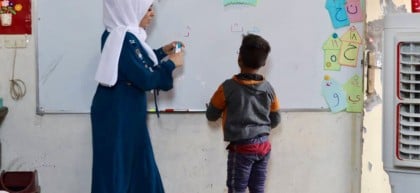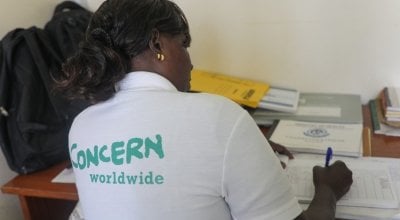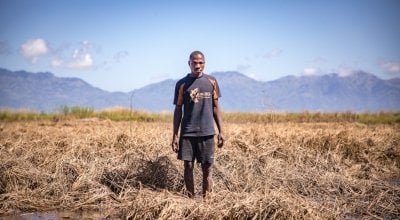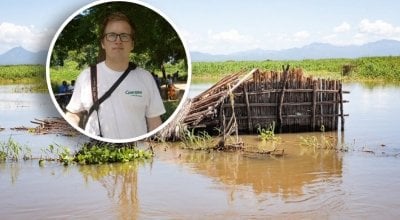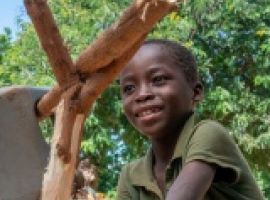
Read our 2022 annual report

Knowledge Hub
Malawi’s foot soldiers in the fight against hunger
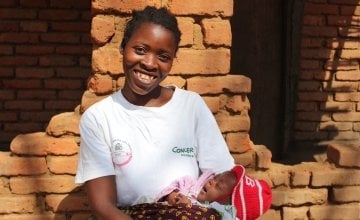
Meet two of the thousands of Malawian women leading a quiet fight against hunger, the one that you won’t see in the headlines.
What does “fighting hunger” look like? A UN plane ejecting food packages to a remote community? An anxious mother hand-feeding food sachets to a malnourished child? Could it also be a group of mums gathering to discuss issues like family planning and hygiene? Meet two Malawian women leading the quiet fight against hunger – by educating themselves and their communities.
In Malawi – where the hunger situation is registered as ‘serious’ by the 2016 Global Hunger Index (GHI) – childhood malnutrition is one of the biggest struggles communities are facing. Only 8% of children under two receive a “minimum acceptable diet” and 40% of under fives are small for their age – or stunted. Over 6% of children in Malawi will die before they ever reach their fifth birthday.
Ireen Chinglanda, care group promoter
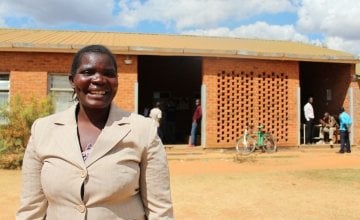
Ireen, a farmer and mother from Mkanda in Mchinji, has long borne witness to the impact of malnutrition on her community – children doomed never to reach their life’s potential because their early years are blighted by hunger. Desperate to change the pathway for Mchinji’s children, two years ago, Ireen became a volunteer with Supporting Nutrition Improvement Component (SNIC) project, implemented by Concern across the district.
Ireen greets us with a warm smile in a field behind a health centre in Mkanda’s bustling trading post. The yellowing meadow is quiet today but once a week it comes alive. It’s here that parents and children gather for malnutrition screening and treatment. In her role as care group promoter with the SNIC project, Ireen is working towards the day when this weekly queue has disappeared. A day when malnutrition in Malawi is prevented rather than cured.
Every two weeks, Ireen meets with 36 “lead mothers” in her community and trains them on ways to prevent childhood malnutrition. She covers a surprisingly diverse range of subjects – from hygiene and nutrition to crop diversification and family planning – a curriculum which reflects the many, interconnected drivers of the problem. These lead mothers, in turn, pass this knowledge onto “clusters” of twelve or so other mothers in their village.
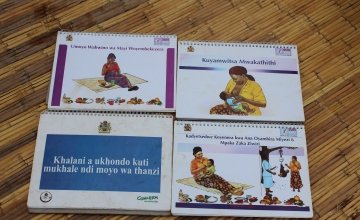
Over the past two years, Ireen has seen tangible changes and she’s keen to talk about the difference that the project has made. She tells us:
I’ve seen a change in how cluster members and the lead mothers practice hygiene and sanitation
Before they started the programme, only a few houses in her village had toilets, and this led to health problems, exacerbating malnutrition. Most households have now built toilets after learning about the benefits, Ireen says, and they’re using them.
In Malawi, many diets are heavily reliant on very few crops – and often on maize only. This means that young bodies are not receiving the nutrients they need to grow. As a mother of four children aged six to 21 years, Ireen herself has found the SNIC training on the six essential food groups to be critical. She tells us:
As mothers we now know how to diversify our diets and include the right mix of foods – and we learnt it all through the project.
Josephina Oscar, lead mother
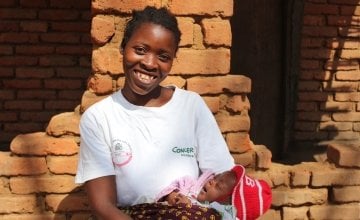
We meet lead mother Josephina from from Zizwa in Mchinji in a clearing shaded by a tree, not unlike the setting where she gathers her group of mums to meet every two weeks.
Over a year and a half ago, Josephina was selected by a cluster of mums in her village to be their lead. Quick to smile, affable yet focused and direct, she may be only 24, but it’s easy to see why they chose her. Like Ireen, she has been guiding her peers in the ways to prevent malnutrition through the SNIC project ever since. There are no young mothers in her community who aren’t in the cluster, she tells us proudly.
Concern is supporting the training that cascades down from care group promoters like Ireen to lead mothers like Josephina.
Shyleen, Josephina’s youngest child who is only a few months old, lies snugly strapped to her mother’s back throughout our afternoon together, unperturbed by chanting, dancing and lively discussion. Josephina tells us how the knowledge she gained from the project influenced her perspective on check-ups during her pregnancy with Shyleen:
I had my first child before I became a lead mother. For that pregnancy, I went for growth monitoring only in my seventh month, but with Shyleen I went much earlier on in the pregnancy because of what I had learned.
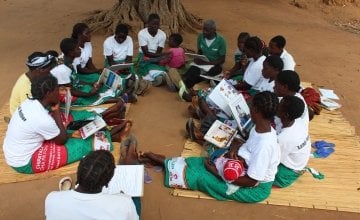
Josephina recalls a mother in her community who tragically died giving birth, and whose newborn went on to become malnourished. Educating women on the importance of healthcare during pregnancy is vital, particularly considering that Malawi still has a high rate of maternal deaths: for every 100,000 births, 510 mothers die. Our work with Josephina on the SNIC project aims to prevent these kinds of tragedies from occurring.
Josephina has a clear message for the people who support Concern to drive projects like SNIC forward. She says:
I appreciate the work of people from Ireland but this shouldn’t be the end. We need this support to continue so that the next generation can benefit.
As for Josephina, when we ask if she will continue to play her role in Mchinji’s fight against hunger, she doesn’t miss a beat. “Well, I won’t be quitting any time soon,” she tells us with a smile.
Read the Global Hunger Index 2016
Learn more about the scourge of hunger across the world in the 2016 Global Hunger Index.
